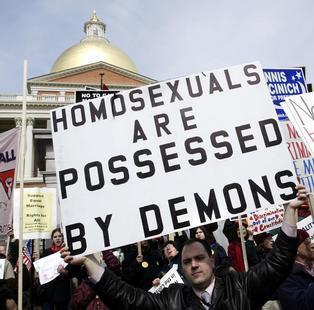
Forbes
In case you missed it, today the Supreme Court heard arguments for and against same-sex marriage. Based on today’s hearing, the Court could decide that same-sex marriage is a constitutionally protected right.
No matter what the court decides (it will be several months before we hear their decision) same-sex marriage is going to happen. One by one, states will eventually decide to make it legal. The tide of public opinion cannot be turned back at this point. Millions of Americans have changed their mind on same-sex marriage, and millions more will in the months and years to come.
I thought I’d share David Frum’s op-ed in which he explains why he changed his mind on marriage equality.
I was a strong opponent of same-sex marriage. Fourteen years ago, Andrew Sullivan and I forcefully debated the issue at length online (at a time when online debate was a brand new thing).
Yet I find myself strangely untroubled by New York state’s vote to authorize same-sex marriage — a vote that probably signals that most of “blue” states will follow within the next 10 years.
I don’t think I’m alone in my reaction either. Most conservatives have reacted with calm — if not outright approval — to New York’s dramatic decision.
Why?
The short answer is that the case against same-sex marriage has been tested against reality. The case has not passed its test…
…I remain as worried as ever about the decline in family stability among poorer Americans. But as for same-sex marriage, my attitude follows the trajectory described nearly 150 years ago by the English writer Anthony Trollope in his novel “Phineas Finn.”
Two of his characters are discussing a proposed reform that has just been defeated in Parliament. The author of the reform is understandably dejected. His friend consoles him by pointing to the future:
“Many who before regarded legislation on the subject as chimerical, will now fancy that it is only dangerous, or perhaps not more than difficult. And so in time it will come to be looked on as among the things possible, then among the things probable; — and so at last it will be ranged in the list of those few measures which the country requires as being absolutely needed. That is the way in which public opinion is made.”
